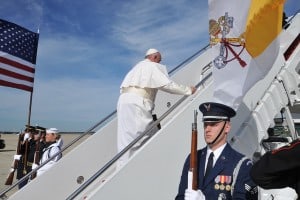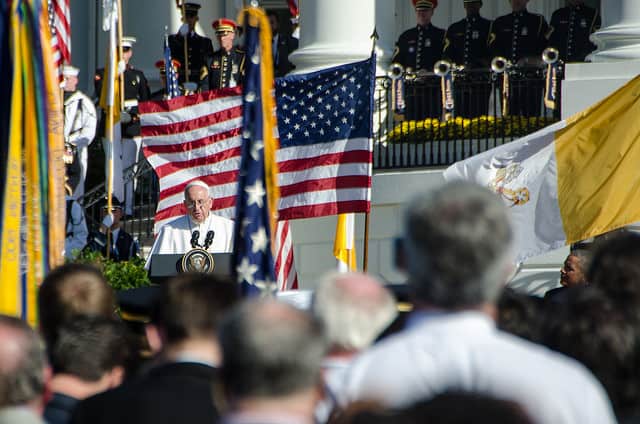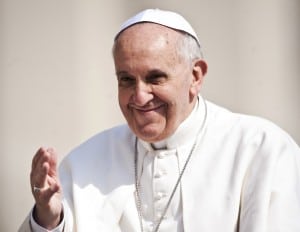It seems unfortunate that Pope Francis should come to America in the midst of our political silly season. Columns, blogs, and talking heads have analyzed his meetings and speeches, sussing out where this or that comment falls in the American political landscape. For some, he is the “progressive Pope Francis” who rankles conservatives. For others, the Holy Father is a “social conservative who opposes abortion and same-sex marriage.” I was surprised to learn that the Successor of St. Peter actually is no other than “the politician Barack Obama tried and failed to be.” And now add to this trend interpretations of the pope’s ‘secret meeting’ with Kim Davis, which is just the latest issue volleyed around, “to score political points.”
All this wondering aloud — and it does get loud — boils down to a single question: is the pope just another political figure? If so, is he a liberal or a conservative?
* * *
A number of commentators have argued recently that the Pope cannot be analyzed as a political figure. This is a contested position, as the tendency to analyze him in political terms is deeply entrenched. But the pope is not a political figure, some say. He can’t be defined by political categories. He transcends politics. He offers a humanitarian rather than a political message. Many have argued that he’s not a politico, he’s a priest. He’s not a propagandist, but a prophet.
Other commentators concede that the pope is a political figure, but qualify it by adding that he is not just a political figure. Peter Steinfels argues that Francis’ “embrace of our shared humanity may drive our political concerns, but it transcends any particular political program.”
These arguments are fascinating to behold, especially in secular media outlets. We owe it to ourselves to reflect on how we will respond politically to Pope Francis’ exhortations. But with all this chatter about the Pope-as-political-figure, I’ve been wondering: What does it say about us that we use these categories in the first place? In other words, what do these political arguments say about us as Americans?
* * *
Consider, for instance, John Boehner’s invitation to Pope Francis to address the Congress. “It’s no secret that John Boehner and Pope Francis don’t agree on all the issues,” stated a recent Crux article. “The Catholic Speaker of the House has made that clear.” Yet Boehner was delighted to welcome Pope Francis to the Hill, because, as Boehner said: “it’s the pope!”
Perhaps unwittingly, Boehner hits on something present in much of the chatter about the Pope’s politics: we see something different about Pope Francis, and we want to know what he thinks. He’s European, yes, but an immigrant; he’s a leader, but he’s grounded; he’s powerful, but approachable. We see someone whom we can proudly embrace as ours. We see someone we can love simply and unconditionally. He draws us together in a way that no one else seems to be able to. Boehner’s quip highlights that Francis’ “political message,” if he has one, is not what is most important. There’s no litmus test for loving Pope Francis. The pope doesn’t care who you are, where you’re from, or what you believe. He simply loves people, and invites us to love one another in the same way. He loves all of us, regardless of our political leanings — and that frees him to challenge all of us.
This kind of love is disarming for Americans, because our society is defined by the opposite sentiment: we feel profoundly and bitterly divided. Our political theater is intractably partisan, and politicians’ appeal rarely extends beyond their ideological tribes. Perhaps ‘appeal’ is an overstatement; American elections often feel like a forced choice between the least repellent candidate. As much as we might like to admire our political leaders, we feel betrayed by their unfulfilled promises. Disappointment and disillusionment lead us to apathy — and away from political participation.
* * *
Enter Pope Francis, and you see the difference genuine appeal makes. Before he utters a word, Francis’ smile and wave speak volumes — and not with the vapid allure of American celebrity. His very demeanor conveys love and mercy; he appeals to our desire for a unity that forgives and heals. We long to love a leader, and this hunger underpins our desire to see him as more than just a political leader.
Even some of the harshest of recent commentary reveals a desire for the pope to transcend our politics. In a notably scathing article, George Will accuses Francis of acting out of a failed liberal ideology, seeking to embrace “secular people with anti-Catholic agendas,” against “what once was the papacy’s very different salvific mission.” And this criticism comes not only from the right. Maureen Dowd recently wrote that “Francis preaches against the elites while keeping the church an elite boys’ club.” For Dowd the pope only appears to preach inclusion, and this is lamentable: she wishes that Francis was the bridge-builder that his media darlings say he is. Both Will and Dowd reveal expectations, however frustrated, that Francis ought to be something more than what we expect from our society. To be clear, I am not saying that we hold these high expectations of Francis simply because we seek unity-at-all-costs. But our desire for harmony does dispose us to love Francis, such that pockets of disappointment — like Dowd’s or Will’s — ironically arise from the same high hopes of Pope Francis. And therein lies an opportunity.
* * *
Francis has stirred something in us, leaving us with the question of what to do with that feeling. As Francis told Congress, the “tireless and demanding pursuit of the common good” should “awaken what is deepest and truest in the life of a people.”
What is deepest and truest in us? Perhaps it’s hard to see in our climate of partisan rancor and polarization. But beneath that defensive shell, there’s a hunger for love and unity that Francis has revealed within us. This hunger points to what we now lack — an empowering unity as a nation. Before we convert his teaching into political plans, he seems to be telling us, we need to emulate his reconciling spirit. It should influence every part of our lives. We should become this love and mercy. And this, I’d venture to say, will have profound political implications.
* * *

Pope Francis Boards His Flights From Washington, D.C., to New York City // US Dept of State on Flickr
A few take-aways stand out from his visit to the United States: where we agree with Francis, we ought not use his “support” for our position as a weapon against our political foes. Where we disagree with him, we ought to seek understanding, rather than dismiss him as either (a) discomfortingly progressive or (b) maddeningly conservative. In either case, we do well to take a step back from our particular concerns to see in him a diagnosis of our deeper problem as Americans: a lack of dialogue, unity, and good will toward one another. As he challenged us:
But there is another temptation which we must especially guard against: the simplistic reductionism which sees only good or evil; or, if you will, the righteous and sinners. The contemporary world, with its open wounds which affect so many of our brothers and sisters, demands that we confront every form of polarization which would divide it into these two camps. We know that in the attempt to be freed of the enemy without, we can be tempted to feed the enemy within. …That is something which you, as a people, reject.
What is the lasting influence of the Pope’s visit? He shows us not how to do politics better, but how to be better fellow citizens, whether we are Catholic or not. His humanity is what gives him credibility around the world, and what makes even the most embittered politicos interested in what he has to say.
Our challenge is to take up this example and incorporate it into our lives. I think Boehner’s “It’s the Pope!” will remain my favorite interpretation of Francis’ time with us. Because it is the pope who inspires us. But now it’s up to us to follow his lead.



